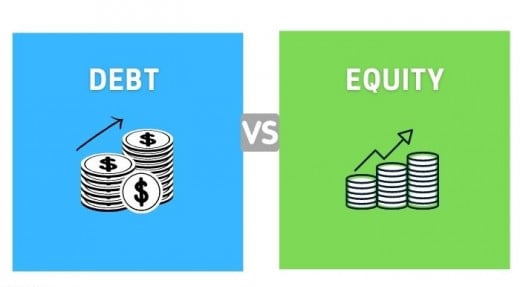Debt vs Equity Financing: Which One is Best For Your Business Venture?

Debt vs Equity Financing: Which One is Best For Your Business Venture?
When it comes to financing a business venture, there are two main paths to take: debt or equity. Each has its own advantages and drawbacks, and the decision on which route to take depends on a variety of factors.
In this blog post, we’ll explore the differences between debt and equity financing and what each option can do for your venture. We'll also discuss which type of funding is best for different business scenarios so you can make an informed decision about which is right for you.
What is Debt Financing?
Debt financing is raising capital by borrowing from lenders. This can be done through loans, lines of credit, or bonds. On the plus side, debt financing is usually less expensive than equity funding. However, if payments cannot be met there may be a need to declare bankruptcy.
Companies may use debt financing in order to invest in new projects, pay for operations and expansions, or simply cover day-to-day costs. This form of financing requires a company to repay the borrowed funds with interest over a set period of time.
The advantage of this type of financing is that it offers no ownership stake, however, it carries the responsibility to repay the loan, with interest, regardless of outcomes.
What is Equity Financing?
Equity financing is when a business raises money by selling shares of ownership in the company. The advantage of this type of financing is that it can provide more capital than debt financing and doesn't require repayment if the venture fails. The downside is that giving up equity in your company means giving up some control over how it's run.
So, which type of financing is best for your business venture? It is difficult to decide which financing option is most suitable for your business problem. Variables such as the amount needed, personal viewpoint on taking debt or relinquishing shares, and the overall risk factor of the venture influence this decision. Hence, seeking advice from financial experts and going through all accessible alternatives will be important before finalizing the choice.
The Pros and Cons of Debt vs Equity Financing
As a business owner, you will inevitably face the decision of how to finance your business venture. Should you take out a loan and go into debt, or should you sell equity in your company to raise capital? Both options have their pros and cons, and the best option for your business will depend on your specific circumstances.
The Pros of Debt Financing
Debt financing gives you the opportunity to maintain control of your business. You don't have to transfer any ownership rights and don't need to answer to external investors. This flexibility can be beneficial if you are intent on expanding your company with no outside influence.
Another pro of debt financing is that it is often easier to obtain than equity financing. Banks and other lenders are typically more willing to lend money than investors are to invest money, so if you need capital quickly, debt financing may be the way to go.
Finally, debt financing is generally less expensive than equity financing in the long run. Interest payments on loans are tax-deductible, so you can lower your overall tax bill by taking out a loan instead of selling equity in your company.
The Cons of Debt Financing
The biggest downside of debt financing is that it puts your company at risk of default if you are unable to make your loan payments. This can result in seizure of
The pros of equity financing
- Equity financing can provide a business with the capital it needs to grow without incurring debt.
- Equity financing can be a less expensive way to raise capital than debt financing, especially if the business is able to offer stock at a discount to its fair market value.
- Equity financing can offer businesses the flexibility to use funds as needed, whether it's for working capital or to finance expansion.
- Equity investors may be more patient than lenders when it comes to repayment of their investment, giving the business time to achieve its growth potential.
- Equity financing can help build brand awareness and credibility, as well as providing access to new markets and customers.
The cons of equity financing
Before evaluating equity financing, entrepreneurs should understand that it may come with some downsides. Those used to overseeing their venture on their own must be cognizant of the potential impact of relinquishing some control.
Another downside to equity financing is that equity financing can be a tricky process. It is not easy to find the right investors who are interested in your business, and it will take effort to build bonds with these potential investors and proficiently present your business venture for funding. You could also end up surrendering more equity than expected to secure funding.
Finally, equity financing carries the risk that should your business not perform as anticipated, the value of your enterprise could decrease. This would consequently mean that investors earn less money on their investment. Unfavorable results such as these could sour relations with the investors and make subsequent funding hard to secure.
In conclusion, as a business proprietor, it is important that you take both debt and equity funding into consideration when assessing how to finance your company. Weigh the pitfalls and perks of each before deciding which path is suitable for you. With knowledge of financial matters and a wise strategy, either approach can be beneficial to the development of any budding enterprise.


Comments
Post a Comment